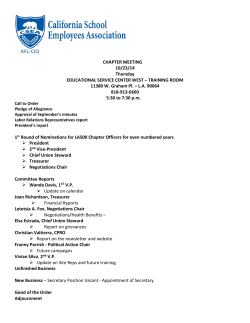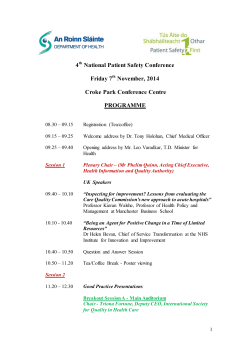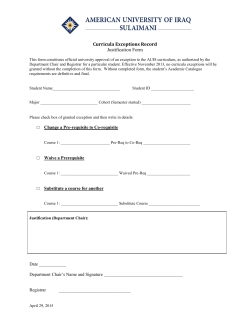
Agenda - E15 Initiative
Second Task Force Workshop on Regulatory Systems Coherence 30 April – 1 May 2015 – Geneva, Switzerland Agenda INVITATION ONLY Thursday 30 April 12:00 – 13:00 Lunch 13:00 – 13:30 Welcome remarks and brief description of the E15Initiative Ricardo Meléndez-Ortiz (ICTSD) Richard Samans (World Economic Forum) - TBC Task force members and observers will be invited to briefly introduce themselves. 13:30 – 14:30 State of play Presenters: Petros C. Mavroidis (Columbia Law School, on leave at EUI) and Bernard Hoekman (EUI) Chair: Ricardo Meléndez-Ortiz (ICTSD) The session will re-introduce the objective and scope of the task force. It will summarize the key takeaways from the first task force meeting, and will define the expected outputs from this workshop. Reactions and additions from the group 14:30 – 15:45 Effectiveness of different forms of international regulatory coordination Presenter: Celine Kauffmann (OECD) on behalf of co-author Nick Malyshev (OECD) Chair: Petros C. Mavroidis (Columbia Law School, on leave at EUI) How prevalent/effective are efforts to use different forms of international regulatory coordination as characterized in Table 1 of the overview paper? What works (does not work) and why? Open discussion 15:45 – 16:00 Coffee break 16:00 – 17:15 Role of international organizations in facilitating regulatory coordination Presenters: Lorenza Jachia (UNECE) and Christer Arvius (Special advisor to the WP.6 Bureau of the UNECE) Chair: Bernard Hoekman (EUI) To what extent is there a need/role for the WTO or other international organizations to do more on coherence, consultation and cooperation in the area of regulation? Can an approach based on the “least trade restrictive” concept found in the TBT agreement be applied to other areas of regulation? If so, what does this mean and how can it be assessed in practice (please take two sectors for illustration of the substantive points)? Open discussion 17:15 – 18:30 Capacity-building in the area of regulation and regulatory cooperation Presenter: Olivier Cattaneo (Yale University) Chair: Harsha Vardhana Singh (ICTSD) What could be done to promote greater coherence through aid for trade to deliver and sustain traderelated technical assistance and capacity-building in the area of regulation and regulatory cooperation? What scope exists for more public-private partnerships in this area? Is there a role for the WTO? Open discussion, with special participation from private sector participants 19:15 Reception and dinner Friday 1 May 9:00 – 10:15 Evaluating the potential benefits of regulatory cooperation- TBC Presenter: Petros C. Mavroidis on behalf of authors Frank van Tongeren, Véronique Bastien, and Martin von Lampe- (OECD) Chair: Harsha Vardhana Singh (ICTSD) What are the potential benefits of regulatory cooperation in terms of lowering compliance costs for firms, enforcement costs for regulators, increasing value for society, and for increasing the effectiveness of regulatory policies? What evidence is there? What are some of the key issues that need to be clarified for more focused and effective co-operation, and what type of research should be done to address this question? Open Discussion 10:15 – 11:30 New forms of pushing the regulatory agenda Presenter: Thomas Bollyky (Council on Foreign Relations) Chair: Petros C. Mavroidis (Columbia Law School, on leave at EUI) Do “clubs” in the WTO offer a useful mechanism to push forward on new areas (e.g., digital economy; data transfers; privacy regulation)? What areas where international regulatory cooperation or standards-setting is already being pursued could benefit from inclusion into a PA or CMA in the WTO? Would it be easier to include these in the WTO as Guidelines or Principles, rather than formal legal disciplines?) Open Discussion 11:30 – 11:45 Coffee break 11:45 – 13:00 Effectiveness of cross-cutting efforts to ensure regulation does not present barriers to trade Presenter: Petros C. Mavroidis on behalf of author Steve Charnovitz (George Washington Law School) Chair: Bernard Hoekman (EUI) What are some examples of national cross-cutting efforts to ensure regulation does not present a barrier to trade? Does the implementation of US Executive Order "Streamlining the Export/Import Process for America’s Businesses" and establishment of a Border Interagency Executive Council provide lessons for internationally-minded approaches behind the border? Open discussion 13:00 – 14:00 Lunch 14:00 – 15:15 Improving transparency and knowledge of the trade effects of regulation Presenter: Robert Wolfe (Queen’s University) - via videoconference Chair: Petros C. Mavroidis (Columbia Law School, on leave at EUI) Should there be greater effort to improve transparency and knowledge of the trade effects of regulation? Can/should the WTO become a forum where deliberation occurs on regulatory matters in areas not subject to multilateral disciplines? If not, what other forum can be considered? Open discussion 15:15 – 15:45 Missing think pieces review Chair: Bernard Hoekman (EUI) The task force will review the missing think pieces and will identify additional critical think piece topics which need to be commissioned. Open discussion 15:45 – 16:00 Coffee break 16:00 – 18:00 Structuring the policy options Chair: Petros C. Mavroidis (Columbia Law School, on leave at EUI) The E15 Task Force will deliver an output report consisting of policy options for the world trade and investment system to consider in relation to regulatory systems coherence. The task force will divide into breakout groups, with each group identifying the top 3-4 concrete policy options from each session over the last two days. The rapporteurs will report back the findings after the groups merge together in the second half of the session. The theme leader will review and determine which policy options could be incorporated into the final report. Breakout Groups/Open discussion 18:00 – 18:15 Closing: An overview of the E15 and next steps Chair: Sean Doherty (World Economic Forum) This brief closing session will provide an overview of the next steps of the E15, including the process of publication of the policy options by all groups in time for the tenth ministerial conference of the WTO in December 2015 in Nairobi and the Annual meeting of the World Economic Forum in Davos in January 2016.
© Copyright 2025











